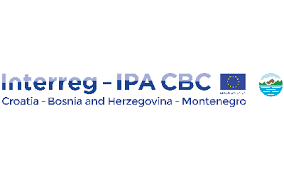Filter Search for grants
Program navigation
Program key data
Interreg Croatia-Bosnia and Herzegovina-Montenegro

| Parent program | European Regional Development Fund |
| Link to the program | interreg-hr-ba-me.eu |
Content of program
| short description | The Interreg VI-A IPA Programme Croatia-Bosnia and Herzegovina-Montenegro will support cross-border cooperation between the participating countries in the upcoming programming period 2021-2027. Expected Programme results will contribute to reaching the goals set by the European Green Deal and underlined by the United Nations 2030 Agenda for Sustainable Development. |
| program objectives | The following priorities and specific objectives have been developed within the programme:
read more |
| Expected results | The programme proposes the following (non exhaustive) types of measures: P1: Smart investments in research, innovation and competitive entrepreneurship
P2: Green investments in environmental protection and efficient risk management
P3: Accessible and resilient health services
P4: Sustainable and inclusive tourism and culture
read more |
Eligibility criteria
| Regions / countries for funding | Bosnia and Herzegovina (Bosna i Hercegovina / Босна и Херцеговина), Croatia (Hrvatska), Montenegro (Црна Гора) |
| eligible entities Partners |
International organization, Public Body (national, regional and local; incl. EGTCs), Education and training institution, Research Institution incl. University, Non-Profit Organisation (NPO) / Non-Governmental Organisation (NGO), Small and medium-sized enterprise (SME) |
| Mandatory partnership | Yes |
| Project Partnership | Projects shall involve at least two partners from participating countries out of which one must be from an EU member state. In order to be eligible, projects must contribute to at least three out of the following four cooperation criteria.
|
| other eligibility criteria | The Croatian part of the programme area includes the following counties: Zagreb County, Sisak-Moslavina County, Karlovac County, Bjelovar-Bilogora County, Lika-Senj County, Požega-Slavonia County, Brod-Posavina County, Zadar County, Šibenik-Knin County, Vukovar-Srijem County, Split-Dalmatia County and Dubrovnik-Neretva County. The programme area within Bosnia and Herzegovina includes Brčko District of Bosnia and Herzegovina and the following municipalities: Bijeljina, Teočak, Ugljevik, Lopare, Tuzla, Lukavac, Čelić, Srebrenik, Petrovo, Gračanica, Doboj Istok, Gradačac, Pelagićevo, Donji Žabar, Orašje, Domaljevac-Šamac, Šamac, Modriča, Vukosavlje, Odžak, Brod, Srebrenica, Bratunac, Milići, Han-Pijesak, Vlasenica, Kladanj, Šekovići, Kalesija, Osmaci, Zvornik, Banovići, Živinice, Sapna, Prnjavor, Srbac, Laktaši, Čelinac, Kotor Varoš, Kneževo, Dobretići, Šipovo, Jajce, Jezero, Mrkonjić Grad, Banja Luka, Gradiška, Kozarska Dubica, Prijedor, Oštra Luka, Sanski Most, Ključ, Ribnik, Glamoč, Bosansko Grahovo, Drvar, Istočni Drvar, Petrovac, Bosanski Petrovac, Bosanska Krupa, Krupa na Uni, Novi Grad, Kostajnica, Bužim, Velika Kladuša, Cazin, Bihać, Doboj, Derventa, Prozor/Rama, Konjic, Nevesinje, Gacko, Bileća, Trebinje, Ravno, Ljubinje, Berkovići, Mostar, Jablanica, Kupres, Kupres (RS), Tomislavgrad, Posušje, Široki Brijeg, Čitluk, Stolac, Neum, Čapljina, Ljubuški, Grude, Livno, Istočni Mostar, Doboj Jug, Kakanj, Maglaj, Tešanj, Usora, Zavidovići, Zenica, Žepče, Bugojno, Busovača, Donji Vakuf, Gornji Vakuf-Uskoplje, Novi Travnik, Travnik, Vitez and Teslić. The Montenegrian part of the programme area includes the municipalities as follows: Herceg Novi, Kotor, Tivat, Budva, Bar, Ulcinj, Cetinje, Nikšić, Podgorica, Tuzi and Danilovgrad. |
Additional information
| Topics | Administration & Governance, Institutional Capacity & Cooperation, Agriculture & Forestry, Fishery, Food, Soil quality, Air Quality, Biodiversity & Environment, Climate & Climate Change, Water quality & management, Arts & Culture, Cultural Heritage, Tourism, Circular Economy, Natural Resources, Competitiveness of Enterprises, Employment/Labour Market, SME & entrepreneurship, Digitalisation, Digital Society, ICT, Disaster Prevention, Resilience, Risk Management, Education & Training, Children & Youth, Media, Energy Efficiency, Renewable Energy , Equal Rights, Human Rights, People with Disabilities, Social Inclusion, Health, Social Services, Sports, Mobility & Transport, Rural & Urban Development/Planning |
| Relevance for EU Macro-Region | EUSAIR - EU Strategy for the Adriatic and Ionian Region, EUSDR - EU Strategy for the Danube Region |
| UN Sustainable Development Goals (UN-SDGs) |
|
| Program documents | Interreg Croatia-Bosnia and Herzegovina-Montenegro 2021-2027 programme (394kB) |
| Contact | Interreg HR-BA-ME JS js@interreg-hr-ba-me.eu Website |
Geschlossene Calls
18.06.2024 - 17.09.2024
Interreg HR-BA-ME: First Call for Proposals
03.05.2023 - 28.07.2023
Interreg HR-BA-ME: Second Call for Proposals
27.03.2025 - 06.06.2025